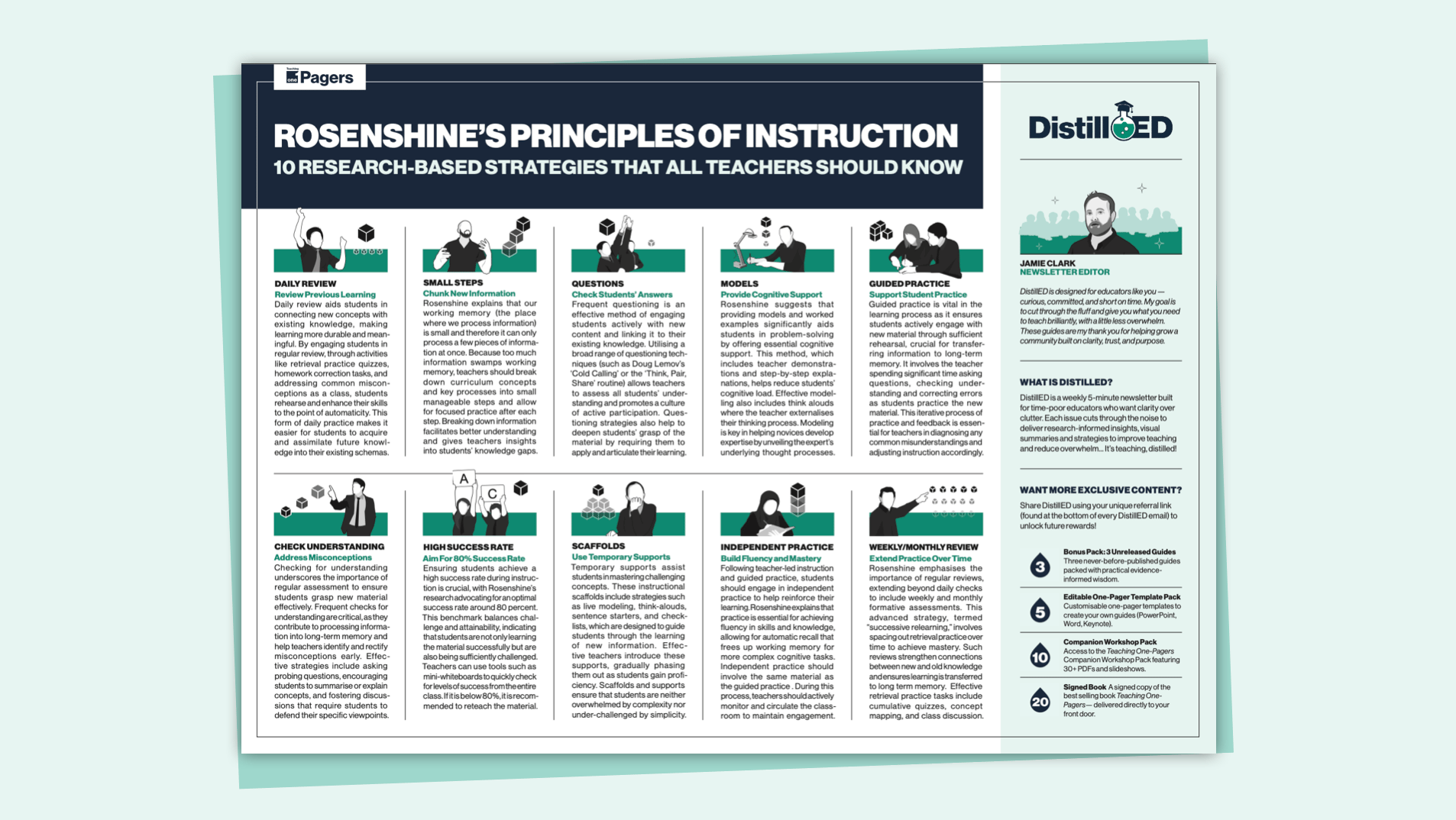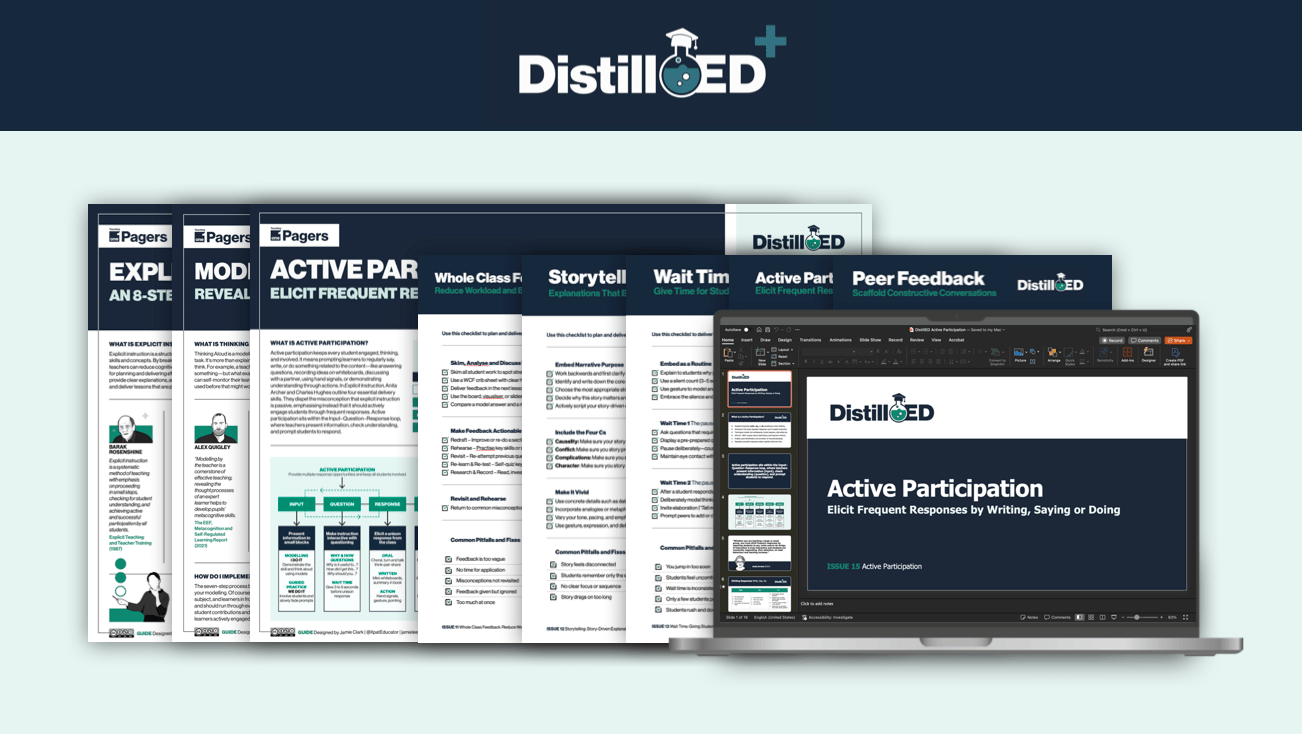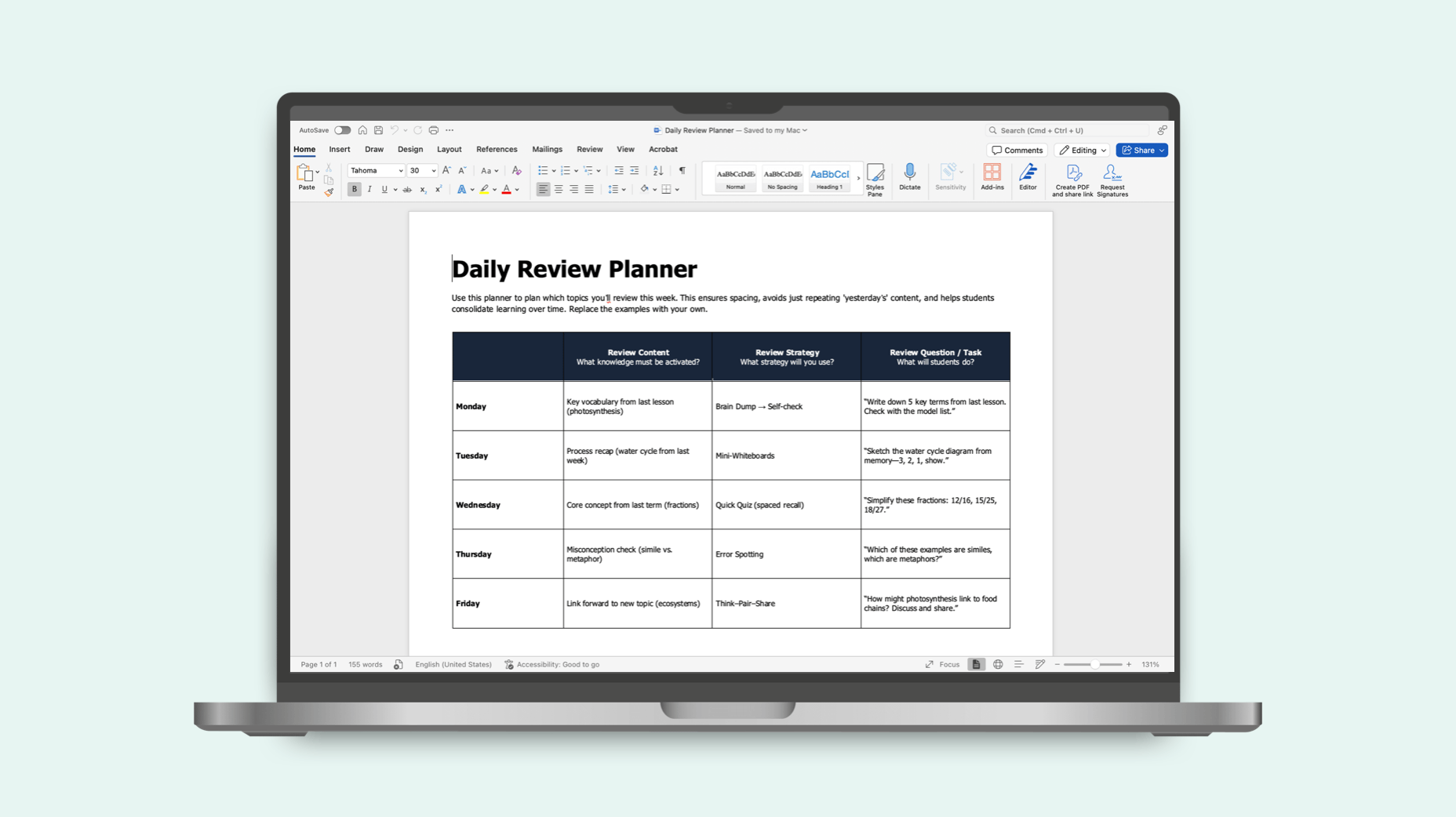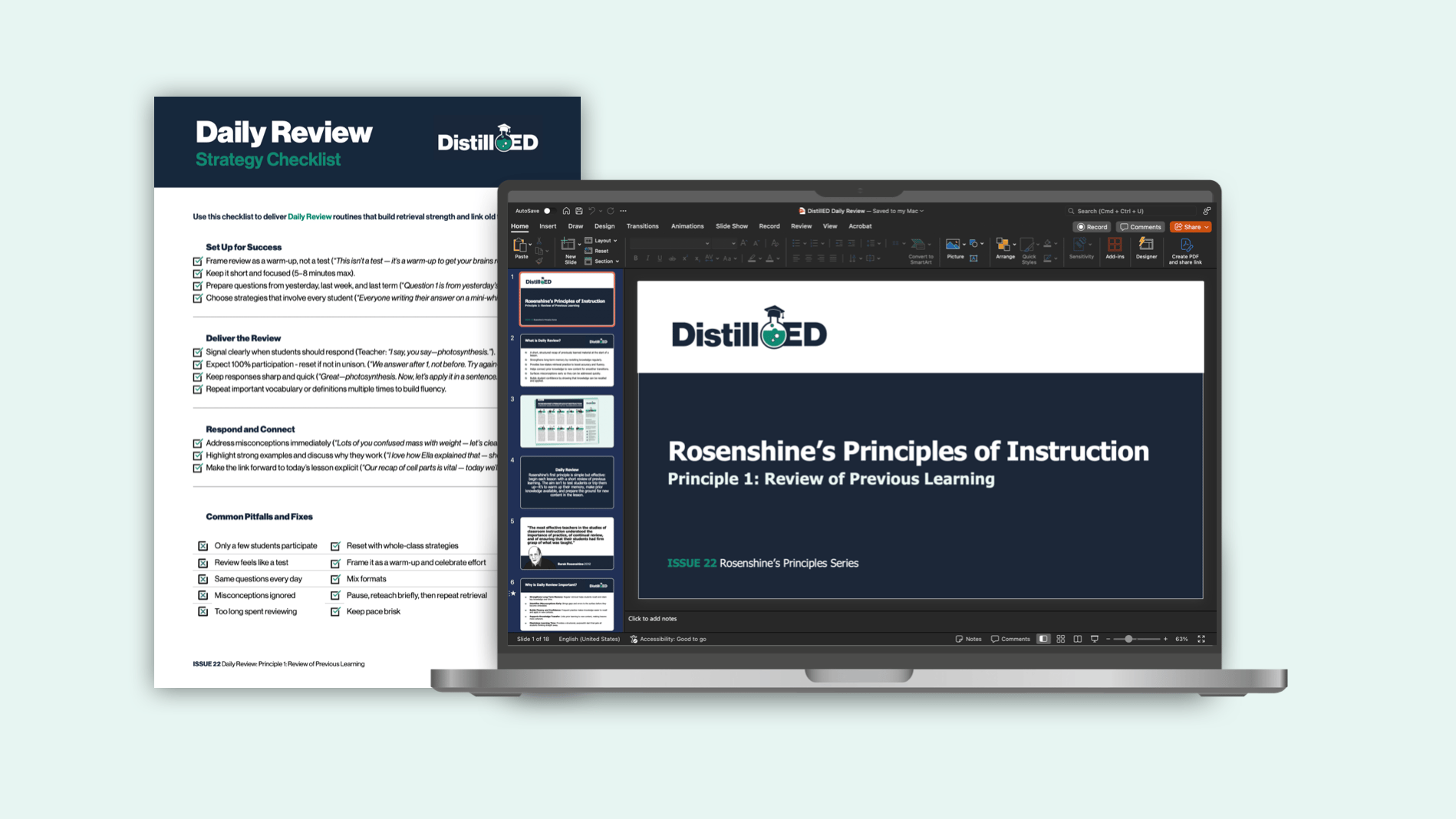👋 Hi {{first name | friend!}}
In this edition of ⚗️DistillED, we explore Daily Review—the very first of Rosenshine’s Principles of Instruction. This strategy helps students strengthen memory, connect old and new ideas, and start every lesson primed for learning.

Barak Rosenshine’s Principles of Instruction
Barak Rosenshine (1930–2017) was an American educational psychologist whose research focused on effective teaching. Drawing on classroom observation, cognitive science, and teacher expertise, he developed the Principles of Instruction—ten practical guidelines that highlight what the most effective teachers do.

These principles emphasise reviewing prior knowledge, presenting material in small steps, checking for understanding, guiding practice, and ensuring all students are successful before moving to independence. They’ve since become a cornerstone of explicit teaching and evidence-informed practice worldwide.
What is Daily Review?
Rosenshine’s first principle is simple: begin each lesson with a short review of previous learning. The aim isn’t to test students or trip them up—it’s to warm up their memory, make prior knowledge available, and prepare the ground for new content in the lesson.
This review can take many forms: a quick quiz, a short recap task, a moment to turn and talk. What matters is that every student is engaged in active recall and pulling information from long-term memory. Think of it a bit like a stretching before a run—without it, students may stumble when they need to build on the momentum of what they’ve learned. In his paper, Rosenshine says:
“The most effective teachers in the studies of classroom instruction understood the importance of practice, and they began their lessons with a five- to eight-minute review of previously covered material. Some teachers reviewed vocabulary, formulae, events.”
Rosenshine gives concrete examples of review activities that teachers can use at the start of lessons. They’re not just “quizzes”—he suggests a variety of tasks:
Review of Homework: Going over the previous night’s work to correct errors and reinforce learning.
Daily Review of Skills or Vocabulary: Brief practice on previously taught material (e.g., math facts, spelling, key terms).
Short Quizzes: Low-stakes checks that give all students the chance to recall important knowledge.
Practice with Flashcards: Especially useful for vocabulary, formulas, or key facts.
Review of Previous Problems: Re-doing or revisiting a problem/task completed in the last lesson.
Correction of Student Errors: Explicitly working through mistakes to ensure misconceptions are addressed.
Rosenshine emphasises that this daily review is short (5–8 minutes) and distinct from weekly or monthly review (which is more about combating forgetting and embedding long-term retention). The diagram below visualises the crucial warm-up: activating what students know and tying it to what comes next.

So why is this so important? Let’s dip our toes into the research…
Why is Daily Review Effective?
A short, structured review at the start of a lesson doesn’t just remind students of what they learned yesterday—it strengthens their memory, reduces unnecessary strain on working memory, and creates a bridge to new material. Most importantly, it helps teachers identify misconceptions before they take root. Here’s a breakdown:
Retrieval Strengthens Memory: Actively recalling knowledge makes it more durable and easier to access in future.
It Reduces Cognitive Load: Refreshing what’s already been learned frees up working memory for new ideas.
Connects Old and New: Review builds links from prior knowledge to the lesson ahead.
Surfaces Gaps Early: Teachers see where students are uncertain and can address misunderstandings quickly.
In other words, a few minutes of deliberate review can transform how much of a lesson actually sticks. Like warmed-up glue, it helps new learning bond securely, rather than sliding off shaky foundations.
“Daily review is an important component of instruction. Students need to practice and review in order to learn new facts and skills and in order to consolidate new learning. The review of previous learning can strengthen the connections among the material that students have learned.”
So, how do we make sure this memory warm-up isn’t just a formulaic routine, but a launchpad for every lesson?
Let’s find out.
DistillED+ PD Resources
Did you know, DistillED+ subscribers get instant access to exclusive PD resources such as new one-page guides, checklists and PowerPoint slides?

How Do I Implement Daily Review?
To make Daily Review effective, it needs to be structured, brisk, and inclusive. Before adopting the 6-step routine below, keep these foundations in mind:
Keep it Short: Aim for 5–8 minutes—enough to activate memory, not eat into the main lesson.
Make it Inclusive: Every student must recall, not just the quick or confident few.
Vary the Format: Rotate between quizzes, discussions, and recall prompts to keep review fresh and engaging.
Review Formats
Daily Review isn’t just “five quiz questions.” Tom Sherrington stresses the importance of varying the diet—so recall is rich, engaging, and generative. Check out his free masterclass on YouTube:
Here are some options:
Quick Quiz: 3–5 retrieval questions from yesterday, last week, and last term.
Brain Dump: “Write everything you remember about…” → then check against notes or model answer.
Mini-Whiteboards: Whole-class recall, visible and inclusive.
Error Spotting: Present a worked example with mistakes for students to find and correct.
Swap and Check: Students quiz each other with prepared prompts, then self-check against answers.
Story Retell: Ask students to retell the “story” of a process, event, or text in their own words.
Keyword Recall: Students recall and define key terms, or use them in context.
Mind Map / Diagram: Reconstruct a concept map or diagram from memory before revealing the full version.
So, here’s a simple process for adopting a daily review into your classroom practice:
Step | Explanation | Example |
|---|---|---|
1. Set the Purpose
| Frame review as a warm-up that helps everyone succeed in the upcoming lesson. | “Let’s warm up with a recap—this will help with the ideas we’re tackling today.” |
2. Ask Generative Recall Questions
| Use specific questions that activate schema and link to today’s topic—not vague “what did we do last time?” prompts. | “Explain how evaporation links to the water cycle—jot your answer. Start with…” |
3. Ensure Everyone Participates
| Involve every student with mini-whiteboards, pair checks, or silent self-quizzing. | “Everyone sketch the diagram—3, 2, 1, show.” |
4. Reveal and Self-Check
| Provide model answers quickly so students can self-check and reflect on gaps. | “Here’s the full answer—check yours and underline any gaps.” |
5. Address Misconceptions
| Highlight tricky areas, discuss common confusions, and reteach where needed. | “Lots of you confused mass with weight—let’s straighten that out.” |
6. Explicitly Link Forward
| Explicitly connect the recalled knowledge to the new material in the lesson. | “Your recap of plant cell parts is vital—today we’ll see how each part works in photosynthesis.” |
A few minutes at the start of a lesson can make the difference between shaky recall and lasting understanding.
Until next time — keep reviewing, keep retrieving, and keep learning sticky!
Jamie
Where can I find out more?
Daily Review Planner (Free Download)
To support your use of Daily Review, I’ve created a Weekly Planner Template — a simple, printable grid where you can map out what to review each day, the strategy you’ll use, and the key questions or tasks. Perfect for ensuring variety, spacing, and intentionality in your reviews.

Checklist and Slideshow
This week’s ⚗️DistillED+ resources are a Daily Review Checklist and a CPD Slideshow. Together, they walk through the WHAT, WHY, and HOW of using daily review to activate prior knowledge, strengthen memory, and ensure every student starts the lesson ready to learn.
Upgrade to ⚗️DistillED+ to download the content.

Upgrade to DistillED+ to get this content!
Join DistillED+
Members gain access to expertly curated digital evidence-informed content
UPGRADEA ⚗️DistillED+ subscription gets you:
- Full access to new premium one-page guides
- Full access to evidence-informed strategy checklists
- Full access to slide templates (PowerPoint and Keynote)



